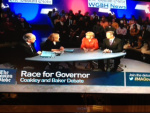Coakley v. Baker – almost a yawn by Marjorie Arons-Barron
The entry below is being cross posted from Marjorie Arons-Barron’s own blog.
 Tonight’s televised benign if mildly tense debate between Charlie Baker and Martha Coakley was clearly a draw, which may have been the defensive objective of all concerned. Comfortably moderated by WGBH talk show hosts Jim Braude and Margery Eagan, both candidates stuck to their well honed, but by now shop-worn messages, spoke calmly, and smiled wanly but just a little. They articulated some subtle policy differences, but it’s hard to walk away with any overwhelming sense of great differences between them. Both are decent people who care about children, women, the mentally ill, the middle class…..well, you get the idea. The question remains as to whether what is said in the campaign will play out in office.
Tonight’s televised benign if mildly tense debate between Charlie Baker and Martha Coakley was clearly a draw, which may have been the defensive objective of all concerned. Comfortably moderated by WGBH talk show hosts Jim Braude and Margery Eagan, both candidates stuck to their well honed, but by now shop-worn messages, spoke calmly, and smiled wanly but just a little. They articulated some subtle policy differences, but it’s hard to walk away with any overwhelming sense of great differences between them. Both are decent people who care about children, women, the mentally ill, the middle class…..well, you get the idea. The question remains as to whether what is said in the campaign will play out in office.
I don’t know if the debate rules prevented the moderators ( or the Globe interlocutors ) from asking crisp follow-up questions. Clearly missing was the feisty engagement Eagan and Braude often exhibit on their program– not letting a guest get away with non-responsive palaver. The stupid question asking each candidate to say what movie stars should play them in a film was only slightly better than Barbara Walters asking what trees they would be.
When the candidate answers were lame (e.g., responding to the moderators’ call to them to disavow PAC ads now airing over and over and over), they both were lame.
I wish they had asked questions the candidates couldn’t answer in their sleep. For example, which governor, living or dead, would each chose as a role model and why? To what extent are Baker’s views of public service and work ethic closer to those of Romney than those of his hero Bill Weld? Does Martha Coakley still believe that she was right to block the release of Fells Acre convict Gerald Amirault after the Parole Board voted 5-0 to release him? Would Charlie Baker have given the same advice?
Baker scored in chiding Coakley for blocking access to the ballot for the casino repeal referendum. But we still don’t what each would do as governor if the repeal fails or succeeds. Coakley is slightly more compelling in her support of the sick leave referendum. Baker differs in what he considers the threshold for the size of companies to which it should apply. Both blew their answers to the inequities of the lottery.
Where there are legitimate questions about their ethical decisions, both are flawed. For Baker, it’s the pay-to-play investigation of a $10,000 contribution to the Garden State’s Republican Committee from Baker’s company. General Catalyst then got a $15 million investment of New Jersey pension monies. NJ Governor Chris Christie, chairman of the Republican Governors Association, also funneled millions into Baker campaign advertising. The NJ investigation results will not be made public until well after the election. Yecch!
For Coakley, the issues are misuse of campaign funds (which she rectified) and of advancing a lawsuit that would benefit one of her finance co-chairs who happens to run the only program in the country to restructure loan foreclosures and earns a very high salary for doing it. Coakley denied that any further disclosure of this seeming conflict of interest was in order. And, indeed, better context is provided on that somewhat overblown issue in Boston Magazine.
The candidates were asked which public misconceptions about them that they most regret. Baker said it’s the notion that he is more about (budget) numbers than about human beings. Coakley says it’s the idea that she doesn’t have a sense of humor. They’re probably both right.
Coakley is trailing Baker in the money department, which is why she has brought high visibility players (Bill Clinton, Michele Obama, for example) to campaign for her. Baker has used Mitt Romney. Endorsements, however ringing, can go just so far. It’s all about the cash, and Baker has four or five times as much money in the campaign as does Coakley. That can translate into lots of last-minute advertising, and that could make a difference. Coakley and her minions may have a better get-out-the-vote ground game, and that too could make a difference.
Tonight’s debate will not. With the candidates margin-of-error “tied” in the most recent polls (Boston Globe, for example, has them each at 41 percent, with each of the three independent candidates drawing three percent or less), this debate did nothing to break the race open. There are two weeks left to suffer through a barrage of ads that most of us have grown adept at tuning out. We’re left with two decent but hardly stellar candidates, and a steadily growing wish that the end comes quickly enough to put us out of our misery.
I welcome your comments in the section below.